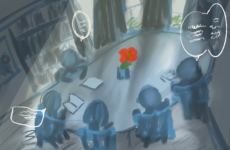Many Choate classes are heavy on discussion — a major part of one’s final grade is determined by class participation.
I have no complaints with discussion on its own; it makes class so much more entertaining because it prompts us all to constantly stay engaged. In fact, I’ve become so accustomed to discussion-based classes that lecture-based classes have become incredibly hard to sit through. There’s really no problem with the Harkness philosophy.
My problem, however, lies in the execution of the “perfect” discussion. What should that involve? Notions like “respect,” “polite disagreement,” or “substantiated opinions” might pop into your head. Yet we forget one: balance of participation.
Despite being an introvert, I’ve found myself very comfortable in the classroom. This high level of comfort means that I usually don’t feel judged, disrespected, or bullied when I speak my mind. However, this doesn’t mean that I get to speak whenever I want to.
I mull over my ideas before voicing them. During a discussion, if I find myself wanting to respond to someone else’s point, I need to fully formulate my response before actually speaking it. Yet discussions happen so quickly — sometimes, before I find a window to assert myself eloquently, the class has already moved on to a new topic.
Some students need time to think. I don’t think that this is necessarily a disadvantage — it’s just temperament. In fact, the ideas these students bring to the table are often incredibly insightful, as they’ve been thoroughly contemplated before reaching the table.
I find myself getting interrupted and blocked out of heated discussions quite easily. There always seem to be several students in a discussion who, because they’re incredibly passionate, never give up their opportunities to talk. Even when I try to raise my hand and chime in, other students will interrupt to make sure their points are heard. Many times, this results in a continual imbalance — certain students staying quiet, whether voluntarily or involuntarily, and certain students repeatedly speaking.
I’m not disparaging outspoken students. In fact, I envy their loud voices and passion. I simply believe that we can take some steps to better include introverts in conversations.
I think the old-fashioned, practical method of raising hands could fix the issue. Some might argue that it stunts the flow of conversation, but it really doesn’t. My World History class last year operated on a hand-raised basis, and all of our discussions went below the surface level.
Moreover, as our teacher made a conscious effort to select those who hadn’t participated as readily in the discussion, everyone got a chance to speak, and everyone’s ideas were accounted for.
From my experience, quiet students are quiet in discussions not because they aren’t fully engaged or knowledgeable, but because they don’t know when or how to join. Implementing simple regulations like hand-raising will include introverts in conversations well.




